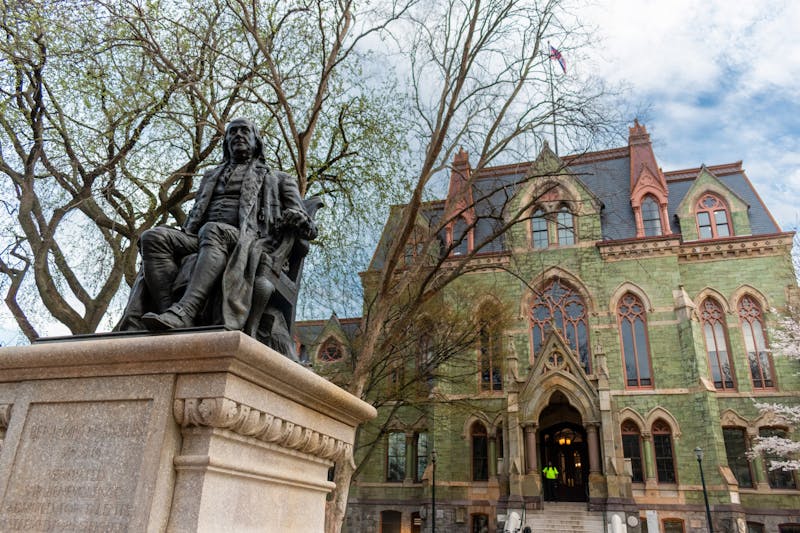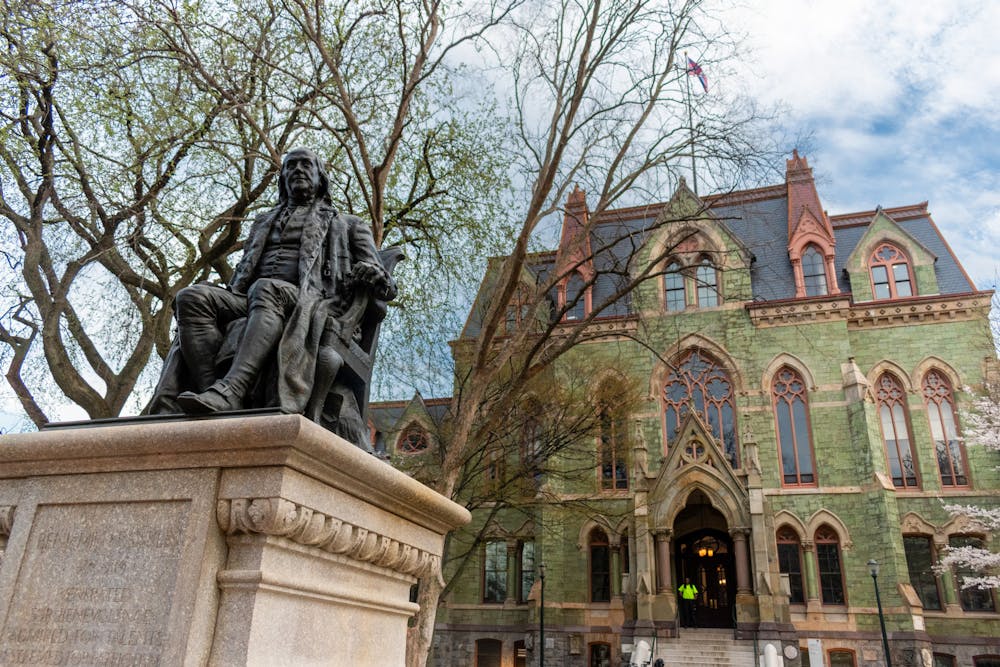Jess Sayin’ | Penn suffocates intellectual ambition, and with it, any hope of societal impact.
35 minutes ago
Columnist Jesse Van Doren argues that Penn makes its students less likely to live lives of service and continued learning.
Credit: Devansh Raniwala
On Tuesday, U.S. News and World Report unveiled the latest edition of America’s ever-coveted 2026 Best National Universities Rankings. After Penn’s tragic tumble to No. 10 last year (devastating, I know), our campus sighed in relief to find that we had clawed our way back up to No. 7 “best.” While U.S. News may have assuaged our fears of a declining reputation, its report obscures a much less flattering reality.
When it comes to scholarly impact, Penn lags far behind its peers.
The University has cultivated a culture that crushes intellectualism, redirecting would-be academics and public leaders away from careers that build knowledge and advance the public good. In doing so, Penn sacrifices its positive influence on the world.
If we examine the circles populated by driven intellectuals, Penn alumni are embarrassingly absent. Let’s first take a look at the Rhodes Scholarship, one of the world’s most prestigious awards. Rhodes offers a fully funded post-graduate education at the University of Oxford to students dedicated to public service. As our peer institutions cultivate a culture of intellectual curiosity, they appear to be churning out Rhodes Scholars in droves.
As of 2023, Harvard has 385, Yale has 263, and Princeton has 217. And Penn? We have just 24. That’s fewer than every other Ivy. Fewer than colleges a fraction of our size, like Swarthmore and Williams. Fewer than schools that focus far less on “prestige,” like the University of Mississippi or the University of Montana. Fewer than places some Penn students have never even heard of like Sewanee: The University of the South.
But maybe the Rhodes Trust just has it out for us? Maybe Penn is still producing graduates keen on acquiring knowledge and bettering society? Well, a quick glance at the Penn Career Services page says otherwise. In their first destinations after graduation, only 16.7% of Penn students pursue an advanced degree. By comparison, for recent classes, that number has been around 25% at Princeton and Brown, 22% at Cornell, and 21% at Harvard.
Not only is graduate school a likely path for those eager to learn, it’s a prerequisite for many impact-oriented careers, whether it be teaching, research, or law. Yet, Penn students remain disinterested. Most of us infused our application essays with ambitions to explore diverse fields and serve our communities, but by graduation, those sentiments have entirely eroded. Of course, entering straight into the work force isn’t inherently negative. But as I’m sure you’re aware, most of us aren’t signing on with nonprofits or schools — we’re heading to J.P. Morgan or McKinsey, pursuing a life in service of ourselves.
What if Penn students are using lucrative starting salaries as a launchpad for careers in intellectual thought and impact? In that case, you’d still expect to see Quakers in the institutions producing knowledge and serving society. That doesn’t seem to be the case. When it comes to academia, for instance, Penn alumni aren’t exactly a leading presence. Take the Nobel Prize, largely awarded to researchers who have provided “the greatest benefit to humankind.” Of the 1,012 Nobel laureates, I can find just three who attended Penn as an undergraduate, all having graduated more than 60 years ago. Needless to say, that’s a pretty poor showing.
Beyond academia, consider the United States Congress, a body grounded in public service (even if it doesn’t always seem that way). Based on House and Senate rosters, of the 535 current members of Congress, just two hold an undergraduate degree from Penn. Compare that to 12 from Georgetown, 14 from Stanford, or 17 from Harvard (surprise, surprise). Ultimately, Penn students leave campus drained of their interest in intellectually meaningful pursuits, leaving the halls of thought and public service to be shaped by alumni from everywhere but here.
Any way you cut it, Penn graduates have steered clear of lives defined by continued learning, the creation of knowledge, and service to humanity. Our students enter college as some of the country’s most enthusiastic learners and impassioned advocates — Advanced Placement course collectors, prodigious musicians, dedicated researchers, and even nonprofit founders. We come as prime candidates for programs like Rhodes, likely aspirants for advanced degrees, and idealistic future leaders. However, sometime during our years here in West Philadelphia, that intellectual flame is extinguished. As that fire dies, so does any chance of Penn being the driver of social good it ought to be.
JESSE VAN DOREN is a College sophomore studying political science and earth and environmental science from Baltimore. His email is jessevd@sas.upenn.edu.
The Daily Pennsylvanian is an independent, student-run newspaper. Please consider making a donation to support the coverage that shapes the University. Your generosity ensures a future of strong journalism at Penn.

